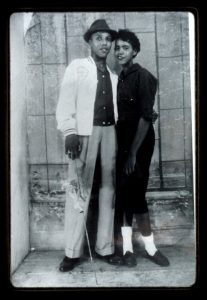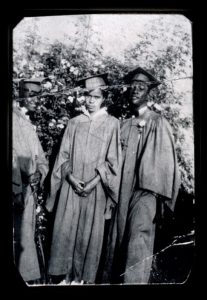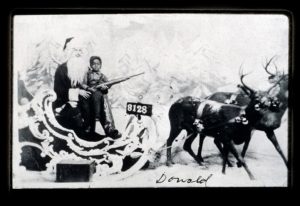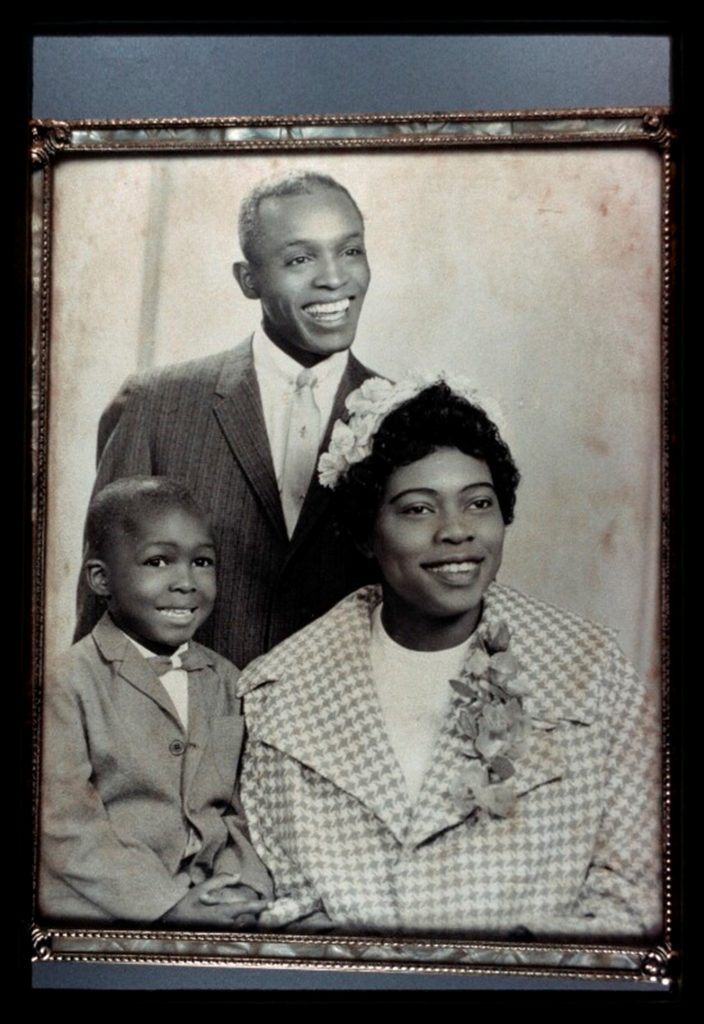Post contributed by Mattison Bond, Project Research and Outreach Associate, John Hope Franklin Research Center
We at the John Hope Franklin Research Center are back again with another blog post to highlight some of the unique oral histories that can be found in the Behind the Veil Digital Collection. Last week’s post featured interviews from folks from Kansas, Louisiana, and Michigan. This week, we take a deeper look into the collection by focusing on the interesting items that can be found from Mississippi, New Jersey, North Carolina, and South Carolina.
You can view Part 3 of this series here: Digging through the Tapes: Exploring the Behind the Veil Collection. Pt. 3 – The Devil’s Tale (duke.edu)
Also all the oral histories that will be featured this week focus on the lives and experiences teachers!
Mississippi
When using the Mississippi location filter, you will find a total of 71 items that are listed in the collection. But using the search bar will let you into another part of the collection that is just as valuable and interesting. It would be a disservice to the researcher to not point to the Mississippi Self-Portrait file that contains a total of 42 pictures of men and women from the 1950s. Flip through the collection to see the faces of graduates, families, couples, and even a Santa Clause.



The oral history that is highlighted today is accompanied with just as many interesting photos. Lucinda Gulledge, born on a farming community in 1913 in Hernando, Mississippi. Along with being a teacher assistant, Gulledge was active within the Civil Rights Movement. The first time she began to take part was when she boycotted the Liberty Cash grocery store because they would not allow Blacks within the facility.

Lucinda could be described as fearless and resilient, as she boldly stated on multiple occasions that she did things other people were afraid to do. Such as driving a woman and her children to an integrated school:
Part 2 00:00“People were just plain scared. And so I don’t guess you could blame them for it. They was plain scared. And this one lady and my son and her daughter was the only two kids in my integrated that school. She wouldn’t carry her daughter over there unless I went with her, she was just plain scared. Some people just had that fear, but I never was. Never was. And so when they went from Davis to Greenwood High, I’d get in my car, I’d go over there and pick both of them up. Pick both of them up, bring them on home.”
And housing some of the white protesters that were coming down to participate in the movement.
Part 1 7:40 “See, I wasn’t like the rest of the Colored people, scared. “No, he ain’t coming to my house.” A lot of them didn’t let them come in their houses. I said, “They can come here.” They come here, and I ain’t never did have to trouble. They stayed as long as they want. Stayed all night. Yeah, they stayed all night. Sure did. When I didn’t cook for them, they would get up and go in there, and fix something their self. Even I had some white ladies to come. Sure did. It was rough, but we made it through.”
Like many folks Gulledge participated in the movement by attending boycotts and marches, even attending a march to see Martin Luther King Jr. She would provide a place to stay to local and sometimes well know civil rights activist like Marian Evelyn Wright, children’s rights activist. She would work with organizations like SNCC and SCLC and help organize voter registration.
You can listen to Lucinda Gulledge here: Lucinda Gulledge interview recording, 1995 August 01 / Behind the Veil / Duke Digital Repository
New Jersey
New Jersey is another one of the smaller location filters within the collection. There is only one oral history within this part of the collection and it belongs to Dolores Bradley, who is actually a North Carolina native from Northampton County.
From Bradley’s interview, researchers gain insight into how the civil rights movement impacted her hometown in rural North Carolina, where she attended Northampton County Training School. She recalls that one of their early fights was for transportation for Black children to attend school. Her father, a principal, and community members organized the NAACP, successfully obtaining buses for Black students and a gym for the school.
Part 1, 12:07 “There weren’t any Black buses originally, I don’t think, when I first started to school, because I can remember my older cousin who was almost 10 years older than me, and his friends. He would wait for them, and they came from a little town, it’s called Pleasant Hill, which was two miles beyond where we lived. They had to walk up almost five miles into town. Then, I can remember a man named Mr. Buffalo, and my dad, Mr. Earl, who was the principal at that time. I guess I must have been between eight and 10 or 11 years old, because I vividly remember when they fought to get the school buses for the Black students to ride. They had meetings and what have you, and basically, that was the same group of people that organized the NAACP in our county”
When Bradley moved to New Jersey, she was originally under the impression that things would be better. She admits to feeling freer in the South than she did up north.
Part 2, 3:41”…I had heard the myth of the North and had bought it. And then, when I moved there, after I was grown and out of college or what have you, I realized that I was no more free than I was in the South. In fact, I think I felt freer, because I was younger and maybe more—Again, I was in that kind of shelter thing in the South. So in some ways, I felt freer than I did in New Jersey.”
She provides listeners with an intimate view of her life as she tries to pursue education, travels to Norfolk, VA, and enjoys holiday celebrations with her family.
Listen to the interview of Dolores Bradley here: Dolores Bradley interview recording, 1995 July 23 / Behind the Veil / Duke Digital Repository
North Carolina
When opening the location filter, you will notice that the first state listed, indicating that it is the largest part of the collection comes from North Carolina. With a total 338 items, the materials within the North Carolina collection span audiocassettes, oral histories, and pictures. Not listed under the location filter are two videos from the Duke University Center for documentary Studies [https://documentarystudies.duke.edu/] that features teachers from Wilmington NC.
These videos detail black education in New Hanover County, giving viewers information about the history of education within the county and the thoughts of different educators about their jobs. For example, Educator Lavinia E. Sneed believed that
Video 2, 7:17 “teaching gave me good full life, and it was because of my opportunity to help develop my students that I feel like my life has been fulfilled. I’m praising the pression of teaching, because it has been the best thing that I have known.
Some would speak on their experiences dealing with desegregation, attending programs to learn about the problems of desegregation sponsored by UNC Chapel Hill and pushing for it within their own schools. Bertha Boykin Todd, a media specialist spoke about trying to purchase books and materials that taught about desegregation.
Video 2, 1:41:50 “I was reprimanded several times for ordering too many books on the desegregation and integration topics. Of course, that didn’t stymie us too much. We continued to provide for our students what we thought was best.”
While there are many teachers to be found under the North Carolina location filter, these videos allow viewers to connect a face to the voice, and to experience first hand the passion and resilience of educators as they strive to make a difference during Jim Crow.
Both videos can be found at these links:
Wilmington, NC Teachers’ Video – 1, 1990-1995 / Behind the Veil / Duke Digital Repository
Wilmington, NC Teachers’ Video – 2, 1990-1995 / Behind the Veil / Duke Digital Repository
South Carolina
There are a total of 123 items within the collection that can be found under the South Carolina location filter. Fittingly, there were more educators interviewed within this part of the collection and thus we will end this blog post with highlighting educator Lula Homes.

Throughout Holmes recollections, the oral history provides a vivid picture of the what it was like attending the historic Penn School, located on Saint Helena Island. She speaks about the classes that were offered and which ones especially piqued her interest.
Part 2, 1:17 “Let’s see. English, literature, math, biology, chemistry. I’m trying to think now. And then, we had the industrial. We had Home ec, sewing…My favorite class would be chemistry. I like history. Ancient history or just plain history.”
There was a clear difference in the what was taught between the boys and girls within the school. Regardless, the Penn school provided opportunities for the children to learn skills that would be helpful to not only them, but the surrounding community. She recalls participating in what was called the “better home day” where,
Part 2, 21:08 “the home ec class would take a building in the community that was in disrepair and they would use it as a project. And the girls, the boys would do the woodwork, put in new interiors…the girls would go and we’d make draperies, we’d make the— Even if the bed was an old bed, either we would find somebody who would give a bed. Some of the stores or some White family would donate a bed or some Black family who had an extra bed or an extra table or an extra, not lamp. Well, oil, kerosene lamp then. And the boys would make, if they had a fireplace, they’d make [indistinct 00:23:06] iron, and so that it would be nice looking. And anything in the house that needed repairs was done. And the boys would take old furniture and refinish it. And then we would have a big day, a celebration where the public could go in and out and see what can be done with little or no money. And that involved both the boys and girls in our industrial work. They saw some of the things that we learned at Penn in our classes. That was a big day.”
While there are no photos directly linked to the oral history, searching for “Lula Holmes” on the webpage provides access to photos of Penn students and campus buildings from another part of the collection.


You can listen to the oral history of Lula Homes Here: Lula Holmes interview recording, 1994 August 10 / Behind the Veil / Duke Digital Repository


